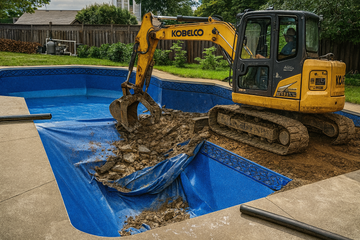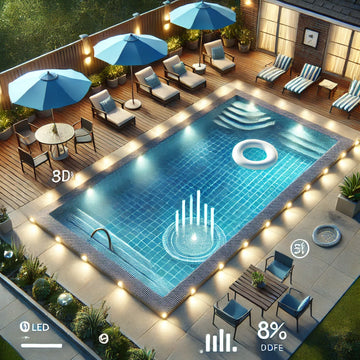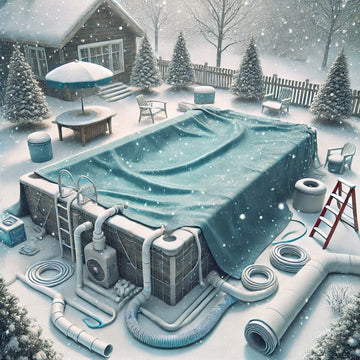How to Prevent Your Inground Pool From Leaking This Winter
Inground pools benefit from proper maintenance and care throughout the entire year. You may not swim in the winter, but it’s still important to take proper care of your pool during this time. Otherwise, you might end up with leaks, cracks, or other problems. Set yourself up to ensure a smooth pool opening come spring and less costly repairs down the road by considering the following guide.
Why Winter Pool Maintenance Is Important
We know you’re excited to reopen your pool in the spring. A lack of sunshine isn’t the only thing delaying your pool’s grand reopening, though. Failing to take care of your pool during the winter will leave you with plenty of work to complete when the time comes to reopen your pool – and these tasks will be much harder if your pool is in poor condition.
Additionally, the mix of snow, harsh winds, and cold temperatures can cause plenty of damage to your pool’s structure. This damage usually exists in the form of cracks and requires costly repairs. The only way to avoid this damage is to routinely monitor your pool’s well-being during the winter and perform proper maintenance techniques.
READ MORE: How To Resolve Winter Pool Maintenance Problems
Inground Pool Maintenance Tips for Winter
Check For Leaks
Unfortunately, pools often face tears, rips and cracks during the winter. Most commonly, cold weather may cause your pool’s liner to expand and contrast, which causes cracks.
The height of the water is your best indicator of whether or not you have a leak. A crack can either leak water out or let air in, resulting in a change in water level. Other signs of leaks include cracks in the ground around your pool and nearby wet spots.
Maintain Your Pool Parts
You might not think to pay much attention to your pool’s filters, heaters and pumps during the winter, but these components are still important even when your pool is not in use. Here’s what you should look out for:
- Ensure that each of these components are working properly, and seek repairs if necessary
- Make sure that all water has been removed from these components – otherwise, they may experience freezing, which will lead to cracks
You may be wondering how long you should run your pool pump. This should ultimately depend on your water’s turnover rate – in other words, how long it will take water to cycle through the filtration system. You may also consider running the pump for longer if you anticipate a high debris buildup. If you are concerned that the water will freeze, you should run the pump for 24 hours.
Check Filtration System
Without a properly functioning filtration system, you run the risk of contaminating your water with suspended particles, which can increase the risk of algae buildup. There are a number of problems your filter could be experiencing. Check your filtration system for the following issues:
- Buildup of debris
- High or low water pressure
- Parts that are damaged or need replacing
Clear Out Larger Debris
It’s not rare to see debris build up in a pool during wintertime. Make sure you regularly check your pool for debris – even if you use a cover. Otherwise, you run the risk of contaminating your pool, leading to bacteria and algae growth.
Pay Attention to Your Water’s Chemistry
You might not enjoy this stage of the pool maintenance process, but it’s still an important one to take, even in the winter. Pools that are not properly balanced with the right chemicals face the risk of bacteria and algae buildup.
Make sure to balance your pool’s pH level and check its alkalinity. Don’t forget to ensure that your chemicals are not too old, as these chemicals tend to lose their potency over time.
Enzyme-based products are great for off-season care, as they can make reopening easier in the spring. These products eliminate non-living organisms, which make up a huge portion of the debris in your pool. They can also reduce the appearance of stains and prevent a ring of dirt from forming around your pool.
READ MORE: A Guide to Pool Winterization Chemicals
Use Algaecide
When you reopen your pool in the spring, you won’t want to start the season with a layer of swampy green debris. This is an organism called algae, and it thrives in water during the winter – especially when the right precautions aren’t taken.
Fortunately, some products, like algaecide, are designed to swiftly eliminate the organism from your pool. Algaecide stops algae from completing the photosynthesis process right in its tracks.
READ MORE: Winter Maintenance for Green Pool Problems
Clean the Deck Area
You know that keeping your pool safe from debris is important. One of the most common ways for debris to enter your pool is from sliding into your pool from the surrounding patio, and the risk of this increases if your pool cover is not installed properly. Try to sweep these areas whenever possible.
Check Your Pool Cover
If you have a pool cover, make sure your cover is properly attached to your pool. Make sure it securely covers your entire pool, and that every bag or other component is in place. Some debris may build up on top of your cover, so make sure you clear it off regularly – especially snow and water, as this can become quite heavy.




